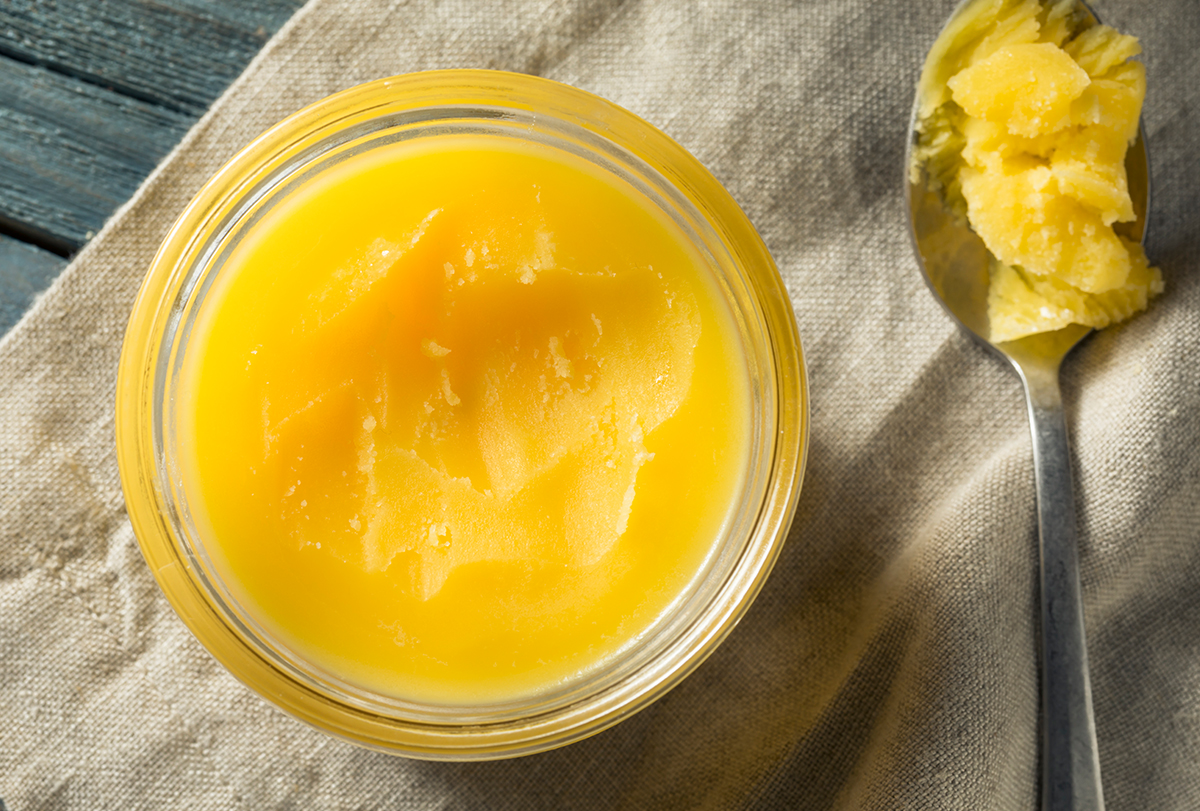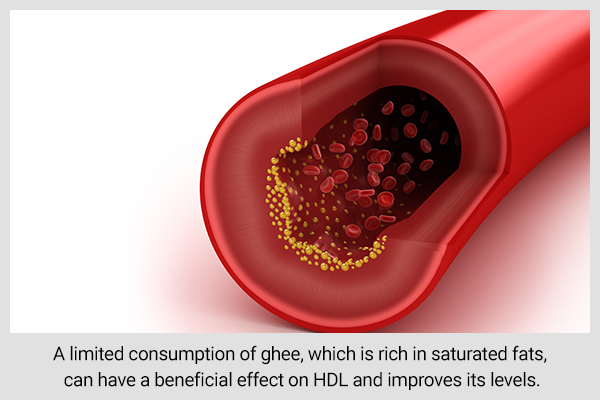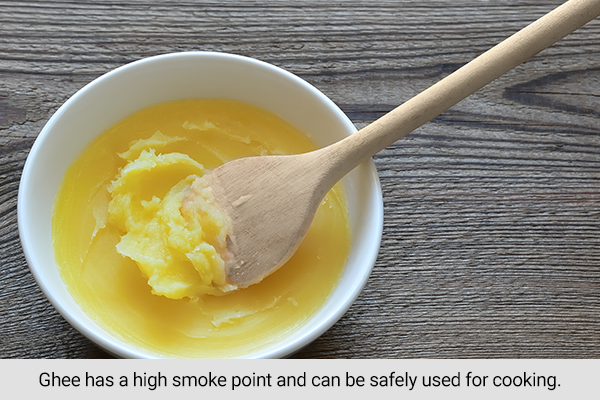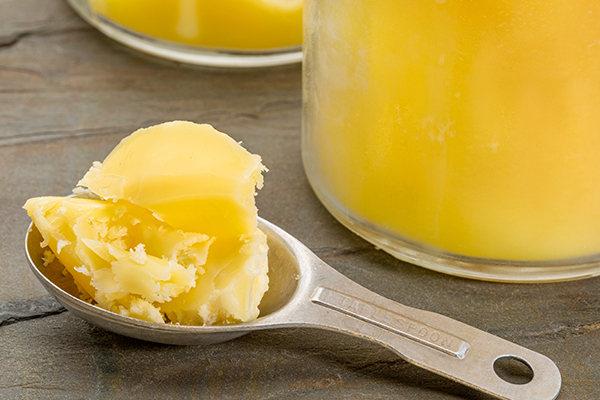In this article:
Ghee, also known as clarified butter, is a quintessential element of South Asian cooking.

It is prepared by heating cream or butter until it boils (100°C). This process removes all the water, leaving behind milk solids and fat. Simple filtering removes the milk solids, and the remaining slightly yellow fat is to be used in cooking. (1)
According to Ayurveda (traditional Indian medicine), ghee has therapeutic uses as it promotes health and protects the body from diseases.
However, ghee is a source of saturated fatty acids and could lead to heart diseases if overconsumed. According to the American Heart Association, saturated fats should comprise less than 7% of total energy intake to reduce the risk of heart disease.
Nonetheless, studies done on total cholesterol and fat levels in the body after consuming 5% ghee showed that it did not significantly increase cholesterol levels. (1)
Reasons to Eat Clarified Butter (Ghee)
Eating ghee can offer the following health benefits.
1. Improves digestion
According to Ayurveda, ghee increases metabolic fire. (1) The fat present in ghee increases the secretion of digestive enzymes and can lead to faster absorption of food. (2)
Include 1 tsp of ghee in your meals to improve and aid digestion.
2. Increases good cholesterol levels

Cholesterol in the body has different components including HDL, LDL, and VLDL. HDL is considered good cholesterol and is responsible for the removal of excess cholesterol from the body. (3)
Limited consumption of ghee, which is rich in saturated fats, can have beneficial effects on HDL and improves its levels. Animal studies have shown an increase in HDL when animals were given ghee as part of their feed. (4)
However, there is a risk of developing heart disease when consuming excessive amounts of ghee, so care must be taken to not overdo consumption. (5)
3. Supports a healthy heart
A study done on people in rural India who consumed high amounts of ghee showed they had a significantly lower occurrence of heart disease. (1)
Ghee made from cow’s milk, which is the most widely recommended type of ghee, contains a higher amount of omega-6, which is a polyunsaturated fatty acid that benefits the heart by removing excess cholesterol from the body and reducing its ability to form plaques and block blood vessels. (6)
4. Reduces risks of arthritis

Ghee prepared from cow’s milk has a high amount of DHA, a type of omega-3 fatty acid that is known to reduce the risk of arthritis. According to Ayurveda, ghee provides lubrication to stiff joints and improves lubrication. (7)
5. May boost immunity
Depending on the milk used to prepare ghee, it can be loaded with fat-soluble vitamins such as vitamins A, D, and K.
Studies have found that ghee made from cow colostrum was able to reduce inflammation in the body, reduce autoimmune responses, and also improve the activity of immune cells responsible for fighting foreign infections. (8)
6. Good for the skin and hair
Ayurveda also recommends the use of ghee for healthy skin and hair. It can reduce hair fall and condition the scalp.
Ghee contains vitamins A and E, (9) which can boost hair growth. (10) These vitamins also improve skin health by improving the moisture barrier, reducing scarring, and protecting the skin from damage due to free radicals. (11)
A teaspoon of ghee can be melted and applied to the scalp and skin to boost their health.
How to Consume Clarified Butter (Ghee)

Ghee has a high smoke point and can be safely used for cooking. (12) It can also be used to top foods, mixed into milk for making turmeric milk, or used for stir-frying.
Make sure you use it in only one meal of the day to avoid overconsumption.
Most-Asked Questions About Clarified Butter (Ghee)
How can I store ghee?
Ghee can be stored in a cool dark place for up to 3 months. If unopened, it can last up to 6–9 months.
How much ghee can a person with heart disease consume?
Intake of 1–2 teaspoons of ghee each day is beneficial along with other oils in the diet.
Is ghee good for people with hypothyroidism?
There is no recommendation for ghee in relation to hypothyroidism. As it is a generally beneficial source of fat, you can consume it in moderation (1–2 teaspoons). However, do keep a check on your cholesterol levels to make sure they stay within the normal range.
Does ghee contain iodine?

Depending on the source of milk used to make ghee, its iodine content can vary. Cow’s milk ghee contains 35.53–41.24. (13)
Can people with lactose intolerance consume ghee?
Ghee is made by boiling away milk solids to retain only fat. This process eliminates lactose, making ghee a better choice than butter for people with intolerances.
Final Word
Ghee is a good source of saturated fatty acids and micronutrients. Ayurveda prescribes the use of ghee for various ailments and it can improve cholesterol levels, joint pain in arthritis, and the quality of hair and skin.
It is important to remember that overconsumption of ghee can increase the risk of heart diseases, so keep your intake within the recommended amounts.
- Was this article helpful?
- YES, THANKS!NOT REALLY


